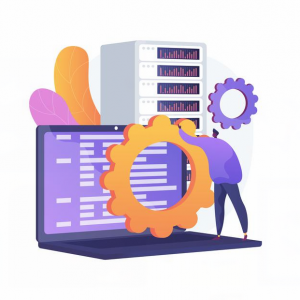How Network Overdrive and Fletcher IT combined to have a sustainable IT Services for the Care and Community Sector

That came out of our founder Greg Clarkson’s decade of work in the for-purpose sector – before:
- the Internet attracted him into IT with its power to aid communication and
- the vision of the community benefits of robust small business led him to start his own IT business.
Greg’s initial vision of a technology company that helped community services with sustainable IT solutions. Initially this was providing low-cost linux solutions and then pivoting to fixed-price IT Managed Services Provider to ensure that service delivery never blew out an organisations budget.
It’s always been about service and impact
We’ve kept our focus on strengthening communities, business, and connection, along with a strong service ethic. That has been a key driver for Network Overdrive’s business culture and business success over two decades.
Throughout our history, NOD has quietly continued to deliver what we call “sustainable IT services” to the NFP sector – an affordable level of service at affordable prices. (Free sounds good – but comes with overhead costs of providers who burn out and disappear.)
Now “it’s official”
Meanwhile, the world has been changing around us. The 20th-century separation between “doing well in business” and “doing good for the world” is fading.
In 2020 we decided that it was important to name and clarify our offering to for-purpose organizations – the charities, not-for-profits, NGOs, and community groups that form the Community Services Sector.
A back-to-the-future engagement
The spark for formalizing our community services activities was generated in 2017-18 when we collaborated on a substantial project with community services sector specialist Fletcher IT Solutions. Fletcher is a niche IT service provider dedicated to helping the for-purpose charities, not-for-profits, NGOs, and community organizations of the community sector.
This project nudged NOD and Fletcher IT Solutions into exploring the growing IT needs of the community service sector in the 2020s. In particular, it highlighted the question of how to provide quality, affordable, sustainable IT services that could support their operations and protect them (without destroying their budget).
This exploration matured into a new partnership, with Fletcher IT becoming a specialist division of Network Overdrive. Peter Fletcher joined us to head this division and as the Regional Manager and strategist for all NOD operations in Queensland.
Micro-business IT support is a major community services risk
When Network Overdrive and Fletcher IT began – both back in 2000 – the technology landscape was much simpler.
In 2000, one person – or a 2-person micro-business team – COULD manage to build enough of the IT skills required to provide adequate IT support to an organization.
Today, the world has changed. The range of tools, solutions, and platforms has multiplied. The threat environment has multiplied. Demands on the for-purpose sector have multiplied. The architecture of solutions and the philosophy of solutions-makers have changed.
Growth of IT availability and complexity
Technology is embedded across all aspects of organizational functions, from accounting to marketing and customer services. Developments from open-source software to cloud computing have changed the way technology solutions can be sourced and applied.
Many of those changes have been for the good, making a wide array of IT productivity and collaboration tools much more affordable AND much more usable. But where do new technologies fit within your strategy – and where do you get the time and know-how to understand their potential and deploy them?
At the same time, external technology-powered threat levels have sky-rocketed. Every technology-using organization is at risk, no matter how small.
Multiplying external risks
The range of external challenges to any computer-using community services organization is multiplying:
- Hacking has become an activity run by organized crime and hostile governments, not just malicious individuals.
- Cybercriminals are an immediate and constant threat of fraud and harmful client exposure.
- No organization is “too small” as attackers seek backdoor entry to bigger targets.
- Technology change is ongoing and accelerating – and failing to mature and adapt can mean the end of the organization.
These threats to the are increasing at a time when:
- They’re providing more high-demand services to the most vulnerable as governments outsource and collaborate.
- Funders are demanding increased levels and proof of security – without the funding increases to pay for them.
- The sector is facing increasing demands to deliver despite starvation-level spend on infrastructure.
- Out-of-date systems and technology leave doors wide open to malicious actions.
- The need for their services has never been greater due to ongoing pandemic, economic and social disruptions.
Demands on the for-purpose sector
Over the past two decades, governments practicing austerity have exited or outsourced more and more community services work, including employment, disability, and a range of specialist support services.
This means that for-purpose organizations have been handed a whole range of increasingly vulnerable clients who need a high level of security protection.
However, as the level of cybercrime has increased, the funding for cybersecurity has stayed static.
One person is not enough
In this environment, no one person – whether they’re a brilliant volunteer or an awesome micro-business support tech – is enough.
The demands of maintaining, developing, and sustainably delivering the knowledge and skills to support and protect the full spectrum of computer functions in an organization are beyond the capability of anyone “computer guy” – no matter how dedicated.
Big IT companies are TOO big
Once an organization gets too big, it gets too impersonal and bureaucratic – and nowhere more so than in big technology companies full of technical specialists, developed to serve big business operations.
Big players are typically too big to maintain the social connections and personal relationships necessary for a sustainable community of service. As a result, for-purpose organizations can spend big on IT advice from major consultancies – without gaining great benefit.